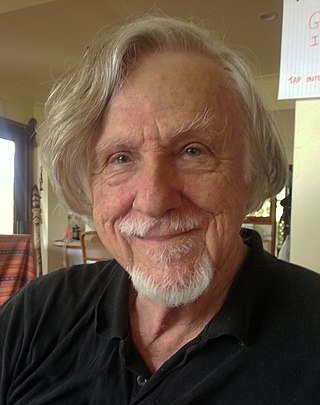Related Research Articles

Arthur Lipsett was a Canadian filmmaker with the National Film Board of Canada. His short, avant-garde collage films, which he described as "neither underground nor conventional”, contain elements of narrative, documentary, experimental collage, and visual essay. His first film, Very Nice, Very Nice, was nominated for an Academy Award.
Robin Spry was a Canadian film director, producer and writer. He was perhaps best known for his documentary films Action: The October Crisis of 1970 and Reaction: A Portrait of a Society in Crisis about Quebec's October Crisis. His 1970 film Prologue won the BAFTA Award for Best Documentary.
William Weintraub was a Canadian documentarian/filmmaker, journalist and author, best known for his long career with the National Film Board of Canada (NFB).

Michael Dattilo Rubbo is an Australian documentarian/filmmaker.
John Feeney was a New Zealand-born director, photographer and writer.
Colin Archibald Low was a Canadian animation and documentary filmmaker with the National Film Board of Canada (NFB). He was known as a pioneer, one of Canada's most important filmmakers, and was regularly referred to as "the gentleman genius". His numerous honors include five BAFTA awards, eight Cannes Film Festival awards, and six Academy Award nominations.
Boyce Richardson, was a journalist, author and filmmaker.
Bonnie Sherr Klein is a feminist filmmaker, author and disability rights activist.

Michel Brault, OQ was a Canadian cinematographer, cameraman, film director, screenwriter, and film producer. He was a leading figure of Direct Cinema, characteristic of the French branch of the National Film Board of Canada in the 1960s. Brault was a pioneer of the hand-held camera aesthetic.
Eskimo Artist: Kenojuak is a 1964 Canadian short film about Inuk artist Kenojuak Ashevak, directed by John Feeney and produced by the National Film Board of Canada (NFB). It won the BAFTA Award for Best Short Film in 1964 and, in 1965, was nominated for the Academy Award for Best Documentary Short Film.

Gerald Potterton was a Canadian director, animator, producer and writer. He is best known for directing the cult classic Heavy Metal and for his animation work on Yellow Submarine.
Challenge for Change was a participatory film and video project created by the National Film Board of Canada in 1967, the Canadian Centennial. Active until 1980, Challenge for Change used film and video production to illuminate the social concerns of various communities within Canada, with funding from eight different departments of the Canadian government. The impetus for the program was the belief that film and video were useful tools for initiating social change and eliminating poverty. As Druik says, "The new program, which was developed in tandem with the new social policies, was based on the argument that participation in media projects could empower disenfranchised groups and that media representation might effectively bring about improved political representation." Stewart, quoting Jones (1981) states "the Challenge for Change films would convey messages from 'the people' to the government, directly or through the Canadian public."
Cree Hunters of Mistassini is a 1974 documentary film co-directed by Boyce Richardson and Tony Ianzelo, chronicling a group of three Cree families from the Mistassini region of Quebec, as they set up a winter hunting camp near James Bay and Ungava Bay. The film explores the beliefs and the ecological principles of the Cree people.

Thomas Cullen Daly, OC was a Canadian film producer, film editor and film director, who was the head of Studio B at the National Film Board of Canada (NFB) in the 1950s and 1960s. On April 27, 2000, he was honored by being made an Officer in the OC. During his 44-year career at the NFB, Daly directed, edited and/produced 315 films.

Joseph (Joe) Koenig is a Canadian filmmaker and entrepreneur who was the founder and president of Electronics Workbench.
Jacques Leduc is a Canadian film director and cinematographer.
John Spotton C.S.C. was a Canadian filmmaker with the National Film Board of Canada.
John Kemeny was a Hungarian-Canadian film producer whom the Toronto Star called "the forgotten giant of Canadian film history and...the most successful producer in Canadian history." His production credits include The Apprenticeship of Duddy Kravitz, Atlantic City, and Quest for Fire.

Albert Kish was a Canadian documentarian/filmmaker.
The 27th Canadian Film Awards were held on October 12, 1975 to honour achievements in Canadian film. The ceremony was hosted by Peter Gzowski.
References
- ↑ National Film Board of Canada (NFB)
- ↑ Film reference library Archived 2007-10-12 at the Wayback Machine
- ↑ Evans, Gary (30 September 1991). In the National Interest: A Chronicle of the National Film Board of Canada from 1949 to 1989 . University of Toronto Press. p. 170. ISBN 978-0-8020-6833-0 . Retrieved 3 January 2012.
Cree Hunters of Mistassini.
- ↑ "Tony Ianzelo - Director". onf-nfb.gc.ca. National Film Board of Canada. Retrieved 9 January 2023.
- ↑ "Tony Ianzelo - Production Personnel". onf-nfb.gc.ca. National Film Board of Canada. Retrieved 9 January 2023.